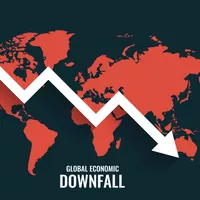Global economy slows down: BBC News-6 Minute English | by 700 Eth | May, 2023 | Medium
Is the global economy slowing down? The World Bank thinks we're heading for recession. This is News Review from BBC Learning English. I'm Neil. And I'm Beth. Make sure you watch to the end to learn vocabulary to talk about this story. And don't forget to subscribe to our channel, like this video and try the quiz on our website.
Now, the story. As prices continue to rise, the global economy is getting closer to a recession. That's according to a prediction by the World Bank. This year, the economy is expected to rise by the smallest percentage since 1991. Reasons for slow growth include Russia's invasion of Ukraine and the impact of the pandemic.
You've been looking at the headlines, Beth, what's the vocabulary? We have ‘overcoming', ‘doom and gloom' and ‘turbulent'. This is News Review from BBC Learning English. Let's take a look at our first headline. This is from the Daily Star in Bangladesh. Overcoming looming economic challenges in 2023.
OK. Let's start with a definition of ‘recession', because that's what this story is about. ‘A recession' is a period of two or more quarters — that's three-month periods — when the economy shrinks. Now, in this headline, it's saying that hard economic times are coming. But the word we're looking at is ‘overcoming' and it's made up of two parts, ‘over' and ‘coming'.
I know both of those parts, but when we put them together, what's the sense? Well, ‘overcome' means you successfully deal with a problem, and a problem that is quite difficult to cope with. So, in this case, ‘economic challenges'. OK. So, ‘overcoming' is similar to ‘defeat' or ‘control'.
Yeah, that's right. So, if you are very shy, you might overcome your shyness — you gain control of it and become more confident. Yeah, or you might be playing sport, let's say football, and if you ‘overcome' the opposition, it means you beat them. But it's not just beating.
With ‘overcome', there is a sense of real struggle — it wasn't easy to win. Yeah, that's right. And we also use this in the passive, but it has a slightly different meaning, doesn't it? Yes. If you are overcome by emotion, it means you have a very strong reaction — you feel it very strongly. You might have a physical reaction.
You might shake with fear or cry. Yeah. And it's not only used with negative emotions, it's used with positive ones as well, like joy or excitement. OK, let's look at that again. Let's take a look at our next headline. This is from Business Live. It's far from being all doom and gloom on the economy.
So, the headline is saying that, actually, it's not as bad as you think. It's not all doom and gloom. Now, ‘doom and gloom' is the expression we're looking at. I like this expression — it's got two words and they both rhyme. But, what do they mean? Well, it's a general bad feeling really.
So, ‘doom' actually means death and destruction. ‘gloom' is to do with darkness — imagine a miserable, grey, rainy day so it's really quite a negative thing. But in this headline it's saying that the opposite is true. It's saying that it's not all ‘doom and gloom'. Yes.
And we use the expression in this way quite often to say that something, isn't as bad as you think. So, for example — at the moment, Beth, I'm actually not feeling very well. It's freezing cold outside, my train was late again… But the sun is shining, so it's not all doom and gloom. Now, a word about this expression — we don't say ‘I'm doom and gloom'.
We use it to comment on how bad a situation is. That's right. So we can list a number of things that are bad or wrong and then comment on that by saying ‘it's all doom and gloom' or ‘it's a bit, it's a bit doom and gloom, isn't it?' Let's have a look at that again. Time for our next headline.
This is from the New Straits Times. Global recession imminent after turbulent 2022. OK, so a recession is ‘imminent' — it means it's just about to start. The word we're looking at, though, is ‘turbulent'. Now, this word, Beth, reminds me of a situation you can experience on a plane. Yeah. You're probably thinking about ‘turbulence' — that's a noun.
So, if you're on a plane and the pilot says' ‘put your seatbelt on', the plane is going to get a bit unsteady, things might start falling down. This is ‘turbulence'. Yes, that is ‘turbulence' — I really don't like turbulence. The word we're looking at though, is ‘turbulent', which is the adjective.
Tell us more. So ‘turbulent' describes something that isn't calm, it might be unstable. Now, we often use this in relation to the state or maybe the history of a country or a place. So, if we are describing that country as ‘turbulent', they might have experienced some conflict, maybe some violence.
And so the headline describes 2022 as ‘turbulent'. Last year was very turbulent — we had the Russian invasion of Ukraine. We had various environmental disasters. We had famine. We had lots of protests around the world. Yeah, you're right. There were lots of issues that made it an unstable or a turbulent year.
Let's look at that again. We've had ‘overcoming' — dealing with a difficult problem. ‘doom and gloom' — we use this to describe a generally bad situation. And ‘turbulent' — not calm; unstable. Don't forget, there's a quiz on our website at BBCLearningEnglish.com. Thank you for joining us and goodbye. Bye.

